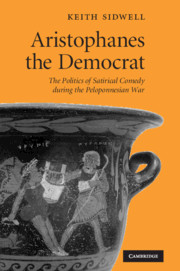Book contents
- Frontmatter
- Contents
- Detail of illustration
- Preface
- Acknowledgements
- List of abbreviations
- PART I SETTING THE STAGE
- PART II THE POETS' WAR
- 4 Acharnians: Parabasis versus play
- 5 Metacomedy, caricature and politics from Knights to Peace
- 6 Metacomedy, caricature and politics from Autolycus to Frogs
- Conclusions and consequences
- PART III APPENDICES
- Bibliography
- Index
- Index Locorum
- Index of Modern Scholars
5 - Metacomedy, caricature and politics from Knights to Peace
from PART II - THE POETS' WAR
Published online by Cambridge University Press: 27 January 2010
- Frontmatter
- Contents
- Detail of illustration
- Preface
- Acknowledgements
- List of abbreviations
- PART I SETTING THE STAGE
- PART II THE POETS' WAR
- 4 Acharnians: Parabasis versus play
- 5 Metacomedy, caricature and politics from Knights to Peace
- 6 Metacomedy, caricature and politics from Autolycus to Frogs
- Conclusions and consequences
- PART III APPENDICES
- Bibliography
- Index
- Index Locorum
- Index of Modern Scholars
Summary
KNIGHTS
We have already dealt in chapter three with the evidence for Eupolis' involvement in the composition of Knights. To recap, the conclusion was that the play borrows the overall schema of Eupolis' Noumeniai of Lenaea 425, in which a wicked prostates of Demos is replaced by an even worse one, plus at least two major characters. One is Paphlagon (a name chosen possibly because of the connection of this Black Sea territory with the export of hides and Cleon's involvement in that trade), possibly represented in Eupolis' play as a tanner, shoemaker and shoe-salesman (cf. Knights 315–21), and a recently acquired slave of Demos (cf. Knights 2). The other is Demos/Cratinus. The market-trader theme will have been calqued on Noumeniai too, with the strong possibility that Hyperbolus was represented there as a lamp-manufacturer and seller (Knights 738–40). A final point of appropriation may be the rejuvenation of Demos. However, far from being an imitation or even a rip-off, Aristophanes' play in fact subverts the earlier comedy's political thrust (the replacement of Cleon by Hyperbolus and possibly the change of Demos from the old Cratinus to the young Aristophanes) by altering the person who gains the prostasia to someone in Eupolis' political circle and probably by throwing in a few other surprises designed to pour scorn upon his rival.
- Type
- Chapter
- Information
- Aristophanes the DemocratThe Politics of Satirical Comedy during the Peloponnesian War, pp. 155 - 216Publisher: Cambridge University PressPrint publication year: 2009



